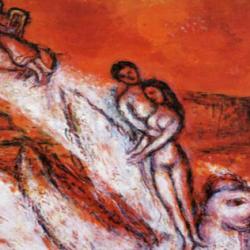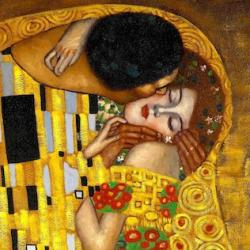How beautiful you are, my darling, how beautiful you are! Your eyes are like doves behind your veil; your hair is like a flock of goats that have descended from Mount Gilead. Your teeth are like a flock of newly shorn ewes which have come up from their washing, all of which bear twins, and not one among them has lost her young. Your lips are like a scarlet thread, and your mouth is lovely; your temples are like a slice of a pomegranate behind your veil. Your neck is like the tower of David, built with rows of stones on which are hung a thousand shields, all the round shields of the mighty men. Your two breasts are like two fawns, twins of a gazelle which feed among the lilies.
Until the cool of the day when the shadows flee away, I will go my way to the mountain of myrrh and to the hill of frankincense. You are altogether beautiful, my darling, and there is no blemish in you . . . .
You have made my heart beat faster, my sister, my bride; you have made my heart beat faster with a single glance of your eyes, with a single strand of your necklace. How beautiful is your love, my sister, my bride! How much better is your love than wine, and the fragrance of your oils than all kinds of spices! Your lips, my bride, drip honey; honey and milk are under your tongue, and the fragrance of your garments is like the fragrance of Lebanon. A garden locked is my sister, my bride, a rock garden locked, a spring sealed up. . . . I have come into my garden, my sister, my bride; I have gathered my myrrh along with my balsam; I have eaten my honeycomb and my honey; I have drunk my wine and my milk. Eat, friends; drink and imbibe deeply, O lovers.
Let us Pray
Almighty God, gracious Father, You knew it was not good for man to be alone, and so you made a helper suitable for him, bone of his bone and flesh of his flesh. You so loved the world that You sent Your Son to become one flesh and one bone with His beloved bride. Be merciful to us this day, so that the marriage of David and Katherine might show forth your power and glory as our Creator and Redeemer. We pray for the sake of Jesus Christ, who lives and reigns with You and with the Holy Spirit, ever one God, unto ages of ages. Amen.
The Song of Songs contains some of the most evocative erotic poetry ever written. Solomon is awestruck at the beauty of His beloved, and he celebrates her beauty from her head down to her feet. Her eyes are like doves, her hair like flocks of goats; her teeth are as even and white as newly-shorn sheep, her mouth is lovely, and her temples like a slice of pomegranate. Her neck is stately and smooth as the tower of David, and her breasts are twin fawns that feed among the lilies.
Solomon draws on the imagery of Eden, the imagery of the land, the imagery of the temple to capture the overwhelming beauty of his beloved. She is his garden of delights, his dwelling place, his fertile land flowing with milk and honey, a temple in which he finds communion and refuge.
In the midst of this intense erotic poetry, we have this surprising address: “You have made my heart beat faster, my sister, my bride; you have made my heart beat faster with a single glance of your eyes, with a single strand of your necklace. How beautiful is your love, my sister, my bride!” And again, “A garden locked is my sister, my bride, a rock garden locked, a spring sealed up.” And yet again, “I have come into my garden, my sister, my bride; I have gathered my myrrh along with my balsam; I have eaten my honeycomb and my honey; I have drunk my wine and my milk.”
This is not the way we normally talk to sisters. If we did, we’d get into big trouble. Yet, here is Solomon addressing his beloved as “my sister, my bride,” a phrase that’s better translated as “my sister-bride.” Solomon is not saying that his bride is a blood relation. The Shulammite is not a sister first, and then a bride, nor vice versa. According to Solomon, she becomes sister at the same moment she becomes bride. For Solomon, marriage establishes not only a marital union of husband and wife, but a kin relationship of brother and sister.
Solomon’s phrase “sister-bride” phrase neatly captures the complexity of his relationship to his beloved. In addition to sister-bride, he also calls her “my friend,” “my dove,” “my perfect one,” “my beauty.” The bride, in turn, calls Solomon “lover,” “the one whom my soul loves,” and “my friend.” No one set of relations can fully describe their multiform love. They are lovers, but they are also friends; Solomon is entranced by her beauty, but she is also his “sister.”
Strange as we might find it, the notion that marriage establishes a kin relation is foundational to the biblical view of marriage. As soon as Yahweh presents Eve to Adam, Adam cries out the first recorded human words, which are also the first recorded human poem: “This is now bone of my bones, and flesh of my flesh.” We often take that phrase as a description of marital union, but in the Bible “bone of bone and flesh of flesh” is an image of kinship. Laban welcomes Jacob to Haran with the words, “Surely you are my bone and my flesh” (Genesis 29:14), and Abimelech appeals for political support from the men of Shechem by reminding them, “I am your bone and your flesh” (Judges 9:2). The tribes of Israel call David to Hebron to crown him king, arguing “we are your bone and your flesh” (2 Samuel 5:1), and David later gets help from the elders of Judah in his struggle with Absalom by appealing to kin relations: “You are my brothers,” he says, “you are my bone and my flesh” (2 Samuel 19:12).
When Paul says (in the AV) that “we are members of Christ’s body, of His flesh and of His bones” (Ephesians 5), he’s telling us that Jesus is our elder brother as well as the husband of the church. Jesus is, in fact, our brother first. He became our brother by his birth from Mary, so that as brother He could rescue us as His bride.
What strikes us as strange in the Song of Songs is that Solomon uses kin language in an erotic poem. But that says more about modern distortions of erotic love than it does about Solomon. Erotic love in our day has been reduced to little more than a desire for sexual pleasure. A man sees a woman, likes what he sees, decides she can give him a thrill, and so pursues her. Increasingly, women are encouraged to think of eros in the same way. The pursuer is only interested in the object of pursuit because of the pleasure he or she can bring. The object of pursuit is precisely that, an object, reduced to a more or less necessary tool for sexual pleasure.
Solomon’s “my sister-bride” is dissonant to us, because Solomon recognizes that his beloved is double. She’s not only the bride who arouses his sexual passion but his sister with whom he lives in domesticated affection. This summarizes the biblical picture of marriage. Husband and wife are not only sexual partners, bride and groom; they are also kin, brother and sister. They not only share a bed; they share a house and a lineage. With her new husband, every bride receives new parents, new sisters, new brothers, new aunts and uncles; and so does her husband. This is not only a fact, but a calling. If you want your marriage to flourish, you must learn to live together in both worlds, and cultivate each of these relations. It’s been wisely said, “A man must have a sister and a bride in his heart before he can get married . . . . It is up to the young man to let his sweetheart know that he knows the other world of non-sex. If he does not know both worlds he cannot get married” (ERH).
Against the modern distortions, in fact, this is what genuin
e eros is all about. True eros is not pleasure-seeking. That’s egotistical and not a recognizable form of love at all. As C. S. Lewis pointed out, erotic love aims not at the pleasure the beloved provides; eros seeks the beloved herself: “Eros makes a man really want, not a woman, but one particular woman. In some mysterious but quite indisputable fashion the lover desires the Beloved herself, not the pleasure she can give.”
Marriage is based on erotic love, but that doesn’t mean that it’s only about passion and pleasure and sexual companionship. It is about that, but it is also about doing the dishes and the laundry, sharing a meal with friends, late-night or early-morning conversations, having and raising children, sweating over the checkbook to make ends meet. And at all these moments, eros ought to be at work. True eros shows itself in the family room as well as the bedroom, when you share tiresome chores as well as when you share romantic moonlit strolls, in the tedium of maintaining a house and keeping track of a family. If we follow Solomon’s lead, we can see that eros is present not only in the lover-bride moments of marriage; the brother-sister moments are also erotic, because at those moments too the husband and wife both “desire the Beloved, not the pleasure he or she can give.”
Seek to embody Solomon’s wisdom in your marriage. By all means, cultivate romance, and continue to nurture the thrilling passion you feel for one another today. Never forget that your wife is your bride, your perfect one, your dove, your beauty. Never forget that your husband is your lover, and the one who draws out your soul. At the same time, cultivate your friendship, your kinship. Never forget your marriage is double, and work throughout your marriage to say “my sister, my bride” – “my lover, my friend.”















